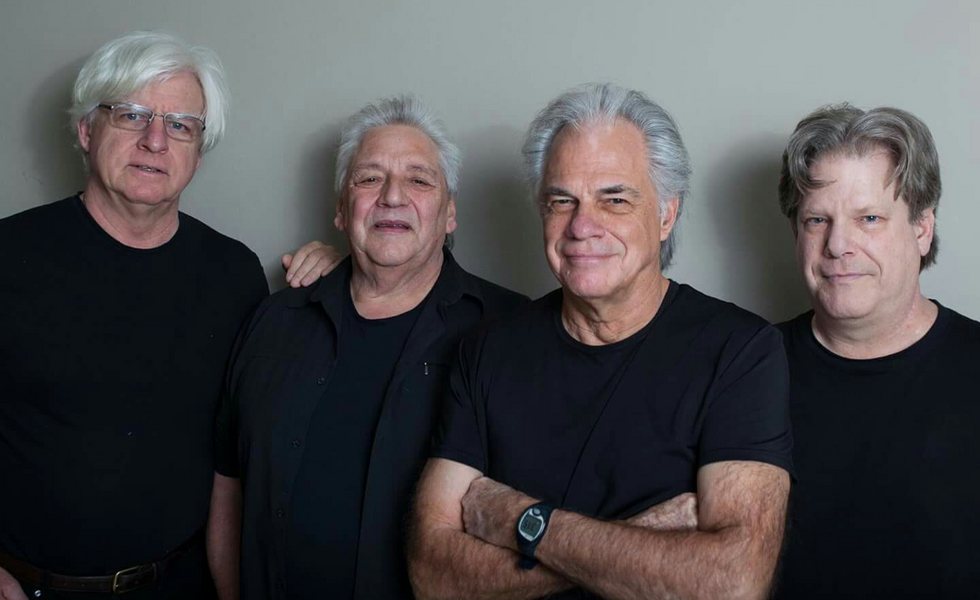Canadian Music Hall of Fame Profile 3: Chilliwack
In the third of our series on new HoF inductees, we talk to bandleader and producer Bill Henderson about his hit group's chameleonic career, the dangers of technology, and the life-saving impact of music.

By Bill King
A band that owned the airwaves for decades, Chilliwack did it through crafting songs that danced between the ears like prima ballerinas. There was something pleasurable hidden in those short motifs that repeated endlessly and engaged the listener.
As many times as I heard the band on the radio, I could never put a face to the music. They weren’t a celebrity-driven band – this was a band that thrived on delivering recordings with irresistible hooks and polished backing tracks. Oh, how grand those long-distant drives and commuter traffic jams passed when Chilliwack played in the background. I caught up with bandleader and producer Bill Henderson for this interview.
Bill King: It’s been nearly five decades since Chilliwack debuted. Does each decade have a different shape and band sound?
Bill Henderson: Actually, our musical style changes happened faster than that. We came out of the psychedelia of the late 60s, landing in more of a country/blues-rock vein with Lonesome Mary, Groundhog and others in the early 70s.
In the transition period between The Collectors and Chilliwack in the late 60s and early 70s Claire, Ross and I were very much an improvisational band with few songs and a lot of jam. The jamming approach was risky but generally hugely successful in our live shows. In the mid 70s Ross, Glenn, Howard and I became more song-oriented and our music morphed into a smoother mellower falsetto infused sound, changing again in the 80s with Brian and Ab into the tighter and tougher sound of Breakdown in Paradise, and then we really narrowed the focus and settled into the precision pop of the early 80s with songs like My Girl, I Believe and Watcha Gonna Do. That continued with Ashley and me in 1984 with our song Don’t Stop.
B.K: Was the direction and sound of the band already formulated in your mind when you made your first recordings?
B.H: Yes.
B.K: The late sixties was a free for all in many areas. Young people migrated from one city, country or zone to another and the music reflected the unrest and free-spirited lifestyles. Did you do any hitch-hiking or journeys connected with the times?
B.H: No, by then I was well past teenage and my journeying was all in my music and the adventures in living that my wife and I undertook with our two daughters.
B.K: What bands artists of that era most influenced you?
B.H: In the late sixties I was most influenced by the San Francisco bands, Cream and the Beatles (from Revolver on).
B.K: How was the band put together and players in place?
B.H: Chilliwack was the same people as the Collectors minus Howie Vickers. So the players were all in place, knew each other well and were already moving down the path of the early Chilliwack band.
B.K: The hits came beginning with Lonesome Mary – Crazy Talk – Fly at Night, but it was when you signed with Solid Gold Records in Canada and Millennium Records in the U.S. that you had your greatest success. What were those years like for the band?
B.H: I’ve always had mixed feelings about them. By then I’d become a “connoisseur” of recording contracts and was very involved in the business end as well as writing songs, producing records and playing shows. We were crazy busy. Most of our time was in the studio and Brian, Ab and I did have a good time there. That was our real work at that time. Brian and I became quite well known as producers and even received a Juno for our production work. With business concerns and the necessity of HITS being so pressing, for me the heart and soul of the music started to drift away.
B.K: Were you big on touring?
B.H: Not in the My Girl era
B.K: Was there an appearance or gig that was a break-out moment for the band?
B.H: In terms of fame, it was probably My Girl and the high-quality video that went with it. In terms of the impact of a performance, there were many that broke us into a larger world.
B.K: You took centre stage on shows like American Bandstand, Solid Gold and The Merv Griffin Show – all three mandatory for national exposure. Any memorable moments?
B.H: Y’know, they were all mimed of course. So we didn’t get to play our music. Just pretend. And the clamour of congratulations for our success was somehow just noise and didn’t have a tenth of the energy that emerges in the making and sharing of music. But the business is just like that, and the business has treated me pretty well. Maybe the most memorable moment for me was an interview on a syndicated radio show recorded in front of a live audience. Inspired by Bob and Doug McKenzie I put on a toque and check jacket and brought a rented chain saw on stage. I told the host I was ready to play him some cuts which really was not very funny and the saw smelled horribly of gasoline. It stunk and wouldn’t start.....so... memorable!
B.K: Each Chilliwack single and album has been recorded with the utmost care. For some – the studio is stressful - for others a place of magic and discovery. How did it work for You?
B.H: Some of the earlier albums are reasonably loose. The first one was recorded and mixed in 36 hours and had Raino which became a kind of cult classic. But we spent more time just mixing My Girl let alone recording it. So the fastidiousness grew with age :-) And yes I did find magic and discovery often started to happen after many hours of studio work.
B.K: Did you labour over tracks?
B.H: Oh yes. One whole day to sing the first three words of I Believe. Maybe the opening lyric “I was lost” put a curse on it. Song did well though. We spent vast amounts of time on tiny details, but it wasn’t wasted.
B.K: When the singles were prepared for release were there consultants asked to determine the chances of radio success?
B.H: Consultants were brought in at one stage. I can’t remember exactly when but I didn’t like it much. I don’t think Brian did either. We both paid attention to early indications from people around us that we trusted. The consultants used funny yardsticks. Some I’ve heard since that time will even tell you that if the tempo isn’t x, y or z beats per minute, it won’t sell. I can’t get into that.
B.K: The band broke-up in 1988 and was without a record deal but later kept touring. What kind of venues were you playing?
B.H: Actually, the last studio album was 1984, and we stopped playing in 1987, I think. Took ten years off, and put it back together in 1997. That band has remained pretty much the same band for 22 years. We honed our playing/performing/finding-the-heart-of-the-song skills, play only really lovely gigs, and are proud of what we can do.
B.K: The band faced loss with the death of bassist Glenn Miller in 2011 to muscular dystrophy.
B.H: …. as well as Brian MacLeod, Howard Froese, Ross Turney and Doug Edwards.
B.K: We all feel invincible when we are young, but life decides for itself where time will take us. Do you have moments when you ask yourself if music was the best career option?
B.H: Since the age of 15, I knew music was the only way for me. First of all, I loved it, and secondly, I couldn’t do anything else. But I was told I’d never make it, that I just wasn’t a pisscutter. Yes, a pisscutter! “That Frank Sinatra now, he’s a pisscutter”. That was said to me, that’s a quote.
B.K: The band continues to play. What kind of schedule do you keep these days?
B.H: 20 to 25 dates a year. Pretty much all plum dates.
B.K: There’s so much great music available online. Is there a band or artist that rocks your world?
B.H: Oh, yes, so many actually. There’s a Mexican Son Jarocho band called Son De Madera. Their Jarana player is a monster rhythm player. Very exciting. In the rock idiom, Cream still rocks my world.
B.K: How are you with evolving technology?
B.H: For a long time I embraced it, but I have to say that computers and the technology that’s grown up around them are becoming downright dangerous. The dream was great. If we could just play fair, treat each other with love and respect, I’m sure technology would follow our lead. But I guess as humans, we are what we are and just have a lot to learn.
B.K: What’s life like away from music?
B.H: Not near as warm. Music saved my life.


















